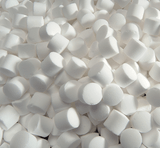The Smooth Operators: A Guide to Compressor Oil Types
How many types of compressor oil are available and what are the differences? Here is a quick breakdown of the types of compressor oil, their uses, and what makes each compressor lubricant unique. Get ready to be wooed by the wondrous world of compressor oil.
1. Mineral Oil: The Old School Champ
Mineral oil has been around the block a few times, making it the true veteran of the compressor oil game. Made from refined petroleum, mineral oil is affordable and readily available. It does a pretty solid job of keeping compressors cool, clean, and well-lubricated. However, it has a few drawbacks. Mineral oil isn't great for the environment, and it breaks down more quickly at high temperatures. It might be a classic, but it's not the best lubricant for every air compressor.
2. Synthetic Oil: The High-Performance Contender
Synthetic oil is the super-slick, high-performance cousin of mineral oil. It's created by chemically combining a bunch of molecules to form a lubricant that's more stable and longer-lasting than its natural counterpart. Synthetic lubricants have a higher resistance to oxidation, which means they can handle more heat and pressure. If you want to take your compressor's performance up a notch, this might be the oil for you. Due to the higher quality, synthetic compressor oils can be higher priced than their mineral-based cousins.2. Semi-Synthetic Oil: The Best of Both Worlds
3. Semi-Synthetic Oil: The Best of Both Worlds
If you're torn between mineral and synthetic oil, let us introduce you to the hybrid superstar: semi-synthetic oil. This compressor lubricant blends the best qualities of both mineral and synthetic oils, offering better performance than mineral oil while still being more affordable than synthetic. It's a win for those who want the benefits of synthetic without breaking the bank.
4. Food Grade Oil: The Tasty Treat
Now, we're not saying you should drink this stuff (seriously, don't), but food grade oil is designed for compressors used in the food and beverage industry. It's odorless, tasteless, and formulated to be non-toxic. Accidental contact with food products and your food grade lubricant won't result in contamination. Just remember, this oil is for specific applications, so don't go swapping it out with your regular compressor oil just for fun.
5. Varnish-Resistant Oil: The Clean Freak
Last but not least, we have varnish-resistant oil. This compressor oil is formulated to prevent varnish, sludge, and other gunk from building up in your compressor. It's perfect for those who want to keep their compressors squeaky clean and running efficiently. It's a bit like having a tiny maid inside your compressor, keeping things tidy and clean!
And there you have it, compressor folks! The fabulous world of compressor oils demystified. From the old-school mineral oil to the high-performance synthetic and everything in between, there's a lubricant out there to suit your needs. So, the next time you're shopping for compressor oil, you'll have a better idea of what you're looking for. Remember to always consult your air compressor manual and compressor fluid usage history to confirm suitability, or feel free to contact us with your compressor information. Until next time, happy compressing!
Recent Posts
-
The Resurgence of Natural Gas Deliquescent Dryers and Desiccants in 2025
How emission-free deliquescent desiccant technology is paving the way for greener operations and low …Jan 06, 2025 -
The Origins and Evolution of Compressed Air Technology
Compressed air, often referred to as the "fourth utility" alongside water, electricity, and natural …Jun 28, 2024 -
Popular Sizes of Vertical Air Receiver Tanks
Sizing and deciding on the best air receiver tank for your compressed air application can be conf …May 05, 2024




